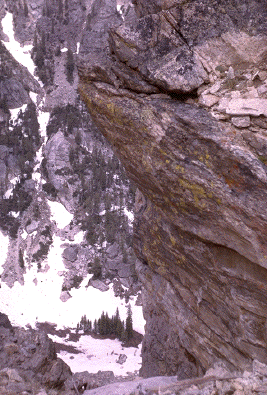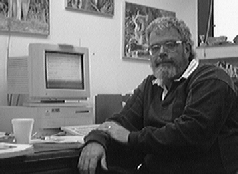
Geology : The View From The Top
Geology : The View From The Top

Dr. John C. Butler
Office: Room 304 Science Research I
743-3411
jbutler@uh.edu
The text for the course is Earth : An Introduction to Physical Geology by Tarbuck and Lutgens, [Sixth Edition, 1999]. Each student should purchase the text and bring it to class.
The Internet will play an integral role in this course. If you have access to the Internet where you live, I encourage you to us these materials from there. Otherwise, you can use the computer clusters in the Social Work building or the terminals in the library. The library offers a number of introductory workshops (including one on electronic resources) that you may wish to consider taking.
Everyone should obtain an e-mail address. If you already have one that is sufficient. If you need one, take your fee statement to the Social Work Building and they will sign you up.
I enourage you to communicate with me via e-mail at the address given above. You may also find it helpful to communicate with classmates via e-mail.
The "home page" address is http://www.uh.edu/~jbutler/physical/physical.html -- if you forget the address you can locate the materials by first looking at the UH page at http://www.uh.edu. Then select -- by pointing and clicking -- the Department of Geosciences (in the College of Natural Sciences and Mathematics). Select Faculty and then John Butler. There is a "link" to the page in my vitae. You should plan to spend at least one hour per week using the Internet. All home work exercises, the reading assignments, and the homework exercises are on the Internet.
This is an "honors" course which means that students who participate in the UH Honors Program will receive honors credit for this course. Students who are not in the UH Honors Program are encouraged in enroll in this section. There is more "extra" work in this section which I believe complement the lecture material.
Geology 1130 is the laboratory that accompanies Geology 1330 and I highly recommend that you enroll in the laboratory this semester. There is a section of 1130 following the lecture course (10:00 - 11:30 AM) that is designed for students in this section. The laboratory is designed to let you become familiar with the properties of rocks and minerals, topographic maps, and other topics that will be discussed in the lecture. My experience is that students who take the laboratory usually do about one letter grade higher in the lecture as compared with the accomplishments of students who take only the lecture.
There are three in-class examinations scheduled during the semester and a fourth examination scheduled during the finals period. Each examination is "worth" 100 points. The lowest test score of the four examinations will be dropped. After the first three examinations a grade will be posted based on the total number of points earned. That is, if you take all three exams during the semester you may elect to skip the final if you are satisfied with your grade. The grade distribution will remain constant once it is posted.
I find it nearly impossible to make up a "fair" make up exam. If you miss an examination, you will receive a 0.0 and that will be the exam that you get to drop. Don't miss two exams!
Each exam is a "final" in the sense that all material covered up to that point is "fair game" although the emphasis will be on material covered since the last examination.
Thus, there are a total of 300 points based on examinations.
In addition, there are two long projects. Each project is divided into check points when certain material should be handed in for evaluation' the check points are noted on the reading list. Each project requires a short paper addressing a specific issue. The various exercises are designed to allow you the opportunity to gather information, manipulate the information, synthesize the information and construct an argument based on what you have learned.
You may decide to work in groups (maximum size of three). The downside is that you will have to police yourselves. Someone (or everyone) must take responsiblity for collecting information and making sure that group assignments are completed. The upside is that you can gain by learning how to work effectively with others.
Each Project is worth up to 100 points -- 25 each for the checkpoints and 50 for the final report. Thus, there will be 300 points for the examinations and 200 points for the two projects. You must earn at least 250 points to pass the course. You can work at your own pace but remember that material is to be submitted on or before the published date.
This course is designed to introduce you to the principles of physical geology - how the Earth works. I want you to get in the habit of relating the lecture and supplementary materials to what you read in the newspapers, hear on the radio or see on TV. For example, every Monday the Houston Chronicle publishes the Discovery Page which has one or two short features plus a log of what has been happening - earthquakes, volcanic eruptions, etc. In between looking at the comics, sports scores, or stock prices, get in the habit of scanning the Discovery Page. The articles that appear are written at a level appropriate for the papers that you will submit.
If you are not familiar with "word processing" this would be a good semester to develop that skill. UH offers a number of short courses in computing and I will post these throughout the semester. I would appreciate a typed "essay" but will read a "neat" hand written copy.
One goal of the course is to introduce you to how geologists "do geology". During the semester I may invite several of my colleagues to present a "guest lecture". The topics presented will be something that these individuals have been involved with during their careers and will be considered as formal parts of the course.